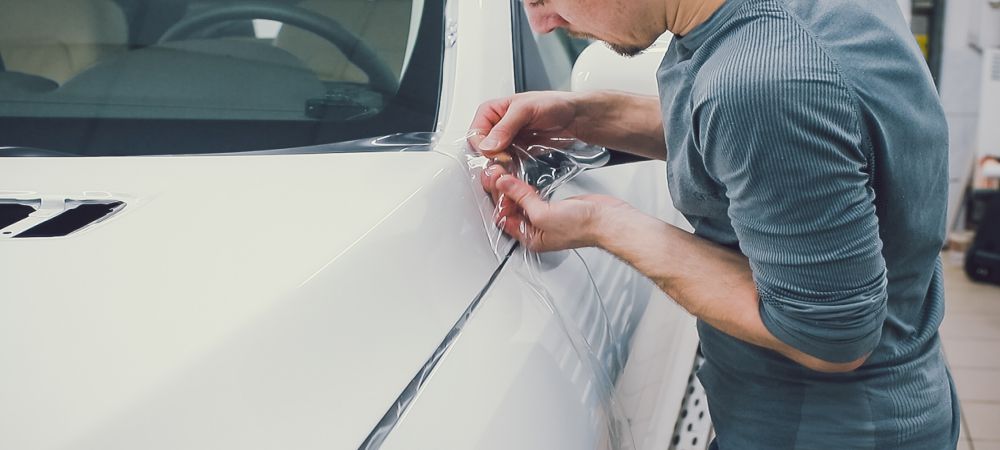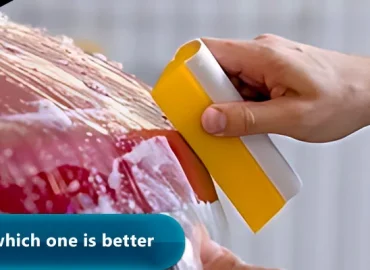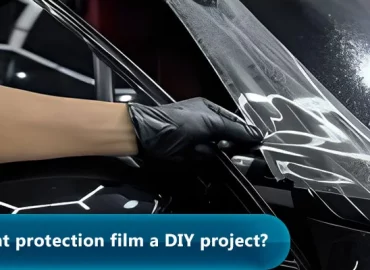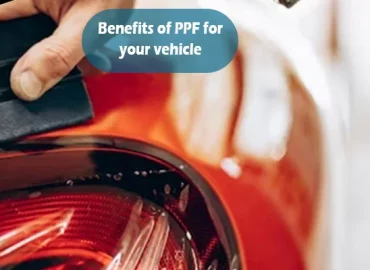There are numerous pros and cons to fixing paint protection films on your vehicles. The truth is, it is never in your best interest to leave your car without any protection. Come rain, come shine, your car’s paint is the only thing protecting the body of your vehicle.
Your car is your loyal steed, and you go to battle the traffic with it every week. The least you can do for it is to get it some form of protection. Remember, your vehicle is also protecting you from the harsh weather (global temperatures are on the increase).
Here’s where paint protection film comes into play. Your car’s paint bears the brunt of everything life throws at your vehicle. Paint protection film is an extra, almost unnoticeable layer that can protect your car’s paint. This is why information about the pros and cons of paint protection film for your vehicle is highly sought after.
Here, we will help you answer the most critical question: is paint protection film good for my car? To help you answer that, we’ll start with a detailed explanation of paint protection film and what to expect from it.
What is a Paint Protection Film?
Before discussing the pros and cons of paint protection film, you should spare a thought about what it looks like. You have probably come across a paint protection film but didn’t know what it was. You may even know it by a different name. Some people call it names like invisible shield, clear wrap, clear mask, etc. These names are all in reference to paint protection film.
A PFF is a thermoplastic urethane film applied to the exterior or outmost painted surfaces of a vehicle. The military initially used it to protect helicopter rotors from sand particles. However, it has since found its way into regular use for private vehicles owned by the public. It consists of three layers:
- Clear-Coat: This is the first layer that serves as the primary protective layer on the paint protection film. It is approximately 0.5mm thick, and it protects the car paint against scratches, oxidation etc. The design consists of specialized elastomeric polymers that can absorb scratch effects and other mild dents.
- Polyurethane: This is the second layer of the plastic protection film material. This material has similar properties to plastic, but it is not plastic. This material protects the car paint from corrosive materials, weather effects and abrasions that manage to breach the clear coat.
- Adhesive layer: This is a gluey layer that enables the film to stick to your car’s body. Adhesives also serve as further protection from UV rays and oxidations. They prevent the car film from turning yellow until they expire. And they also make it easy to remove the film whenever you want to get rid of it.
Related article: Cost of Paint Protection Film In Vaughan: The Important Details
The Pros and Cons of Paint Protection Film
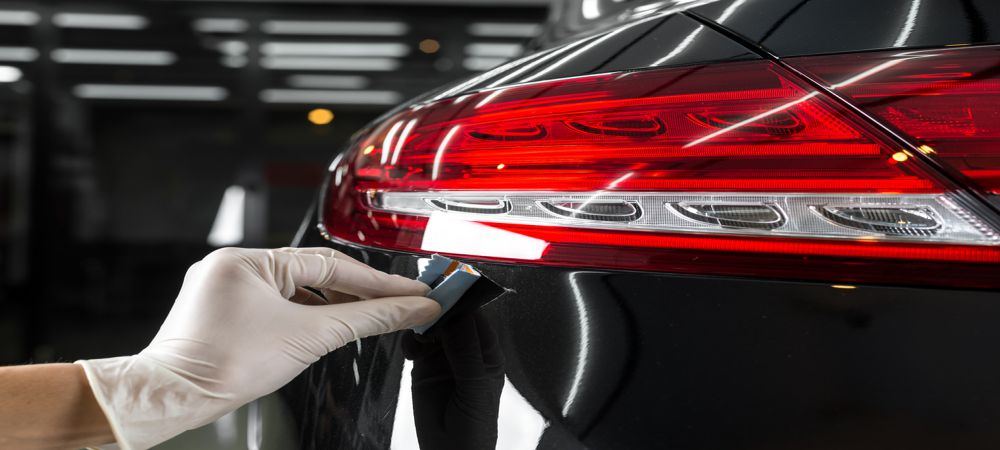
Yes, you’re eager to know the pros and cons of paint protection film. Is it worth it? Does the advantage outweigh the cost? We will answer those questions shortly.
Let’s first take a closer look at some of the advantages of using protection film for your car.
Benefits of a paint protection film
Here are some of the pros of paint protection film:
Protects your vehicle’s paint
Its primary purpose is to protect your vehicle’s paint. Every other perk to it are additions. Essentially, installing paint protection film protects your car paint from intentional and accidental abrasions.
We are all guilty of accidentally scratching our vehicle’s paint every once in a while. A paint protection film saves you the guilt and shame of putting that scratch on your vehicle’s paint.
Also, the recent designs of paint protection films can protect your car paint from the weather’s effects. Your car paint will have protection from the blistering summer sun, as well as the snow, ice, cold and oxidation in the winter. As a result, you can guarantee all-round protection for your vehicle’s paint.
Long-lasting protection
This is subject to the quality of PPF that you use to coat your vehicle. However, most paint protection films last for 4-5 years of continuous use. High-quality paint protection films can last up to ten years of constant use. It’s durability plus self-repair characteristics are the properties responsible for this effect.
Unless something damages your vehicle’s exterior to a significant extent, the PPF is going to be there protecting your paint for a long while. As far as pros and cons go, paint protection film is an investment for the long term.
Self-repair properties
All top quality paint protection films have this property. They can absorb minor abrasions and return to their original forms. Some will require you to heat them a little bit, preferably with a heat blowing gun.
However, the self-healing properties can only work on minor abrasions. If something causes significant damage or tear to the film, there’s no self-repair for that except you glue it back together. Even with this, the repaired point will be prominent, and your PPF will never go back to its usual form.
Enhances the look of your car.
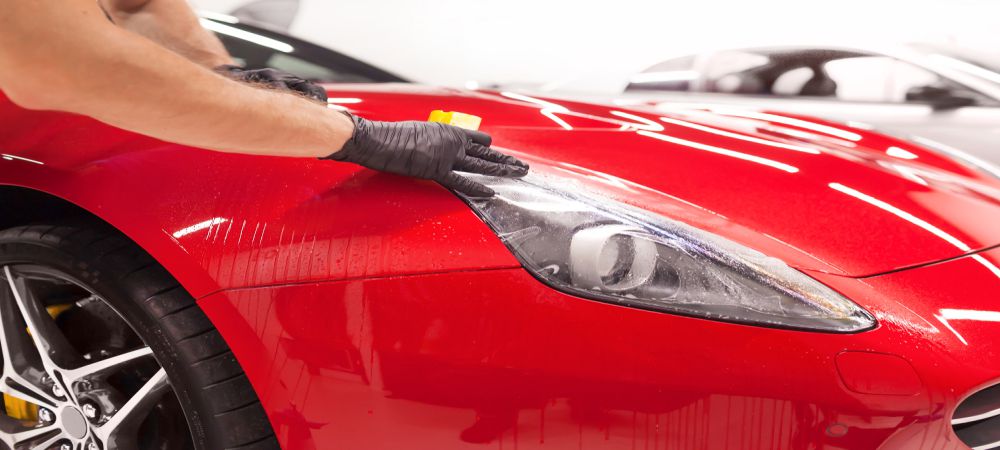
This does not apply to all brands of paint protection films, but it’s still advantageous for the brands that have it. Some paint protection films come in gloss and matte finish. These finishes will enhance the look of your car while also providing some important protection for the paint.
Some people may argue that the PPF takes away a car’s shine rather than enhance it. We say that’s not true. Even if it does happen, it’s probably because the PPF used was of low quality.
Extends the service life of your vehicle’s exterior and preserves its value
Your vehicle’s paint quality is bound to depreciate over time, thus reducing its quality and value. Paint protection film will help your car paint retain its shine for longer and preserve its value. It effectively protects your car paint from debris, rocks, sand, UV light and other weather effects.
When it’s time to part ways with the vehicle, you can cash it up for a better price. But if the car paint looks faded and shabby, it will cause the car’s value to decrease. This means you will have to settle for a lesser price than you will get for a better-looking vehicle.
Good investment: Helps you save money in the long run
When discussing the pros and cons of paint protection film, most people are keen to highlight the price as a con. However, they often forget that paint protection film can save you money.
Without protection for your car’s paint, now and then, you’ll need a new paint job to maintain its shine. Every two years or thereabout, your vehicle will be spotting numerous scratch marks and other unsightly designs. Then, you will need to repaint it to make it look good again. You can save yourself all of that effort by installing paint protection film.
You don’t have to worry about the paint or scratch marks on your vehicle for the next five years. After that period, you only need to change the paint protection film on your car, and the cycle continues.
Downsides of a plastic protection film
There are few things in life without cons in addition to advantages. Paint protection film is not one of them. Here are some of the cons that come with using PPF on your vehicle:
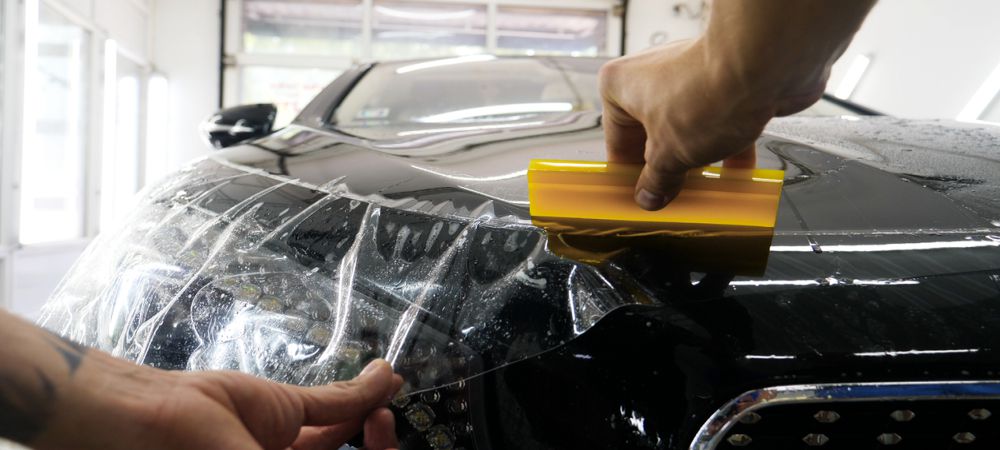
Expensive upfront cost
Most paint protection film installers will require you to provide a non-refundable upfront payment before the job. Keep in mind that the purchase and installation of the PPF cost thousands of dollars.
Having to pay that much can be a challenge for people with average incomes. This makes it seem like a luxury to such individuals. However, if you can afford the cost, it is an excellent investment, and the service is well worth the price.
Cannot substitute or replace a paint job.
Most paint protection films are transparent, i.e. colourless. That means they do not affect your original car paint. As such, if your car needs a paint job, you can’t substitute the paint with a paint protection film. However, the PPF will do a great job of protecting your new paint.
Subject to wear and tear over time
Paint protection film is made of plastic, and it continually bears the brunt of natural forces. This means it will weaken with time. It’s not going to last forever, and you’ll need to change your car’s PPF every 4-6 years.
In our opinion, 4-6 years is a long time, and most PPF brands give warranties lasting up to that timeframe. After that, there’s no guarantee on the integrity of the PPF.
You can’t do it yourself
If you attempt to install paint protection film yourself, you will most probably end up messing it up. You will notice defects like blisters and peels when you fluff the installation. This can lead to wasting PPF films. You can avoid this risk by having specialists do it for you.
Frequently asked questions about Paint Protection Film In Vaughan
Below are answers to some commonly asked questions about PPF:
Can it be removed?
Yes, the paint protection film is easily removable. You can peel it off yourself whenever you want to without leaving any marks on your car paint.
Does it come with a warranty?
Yes, most paint protection film brands and installers offer limited warranties of up to 4 years.
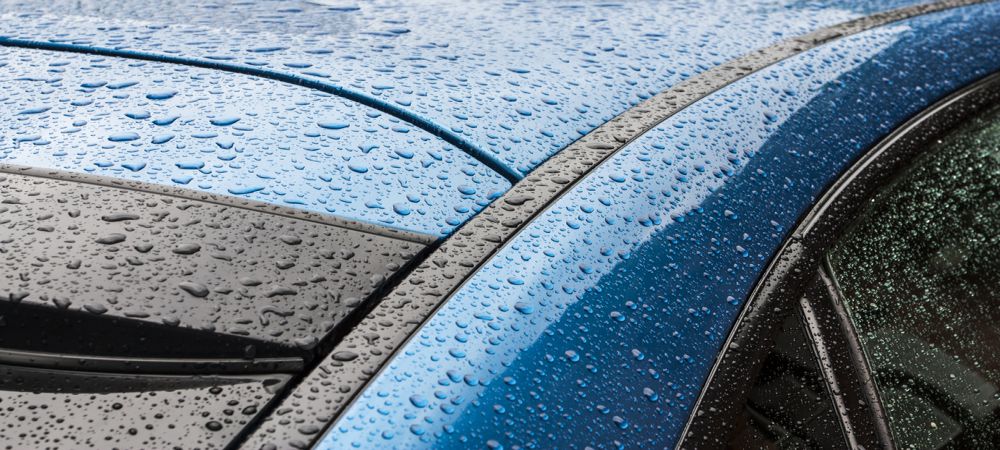
Can I apply it to any part of my car?
Paint protection films are for protecting your car’s paint and most of the exterior of your car. You can apply it to all the impact zones on your vehicle. These are the vulnerable parts like hoods, fenders, side mirrors, bumpers, floodlights, headlights, car door etc.
To Wrap it Up
So there you have it — the pros and cons of paint protection film for your vehicle. However, in our opinion, the pros outweigh the cons except for the cost. If you can afford to install paint protection film on your vehicle, don’t hesitate to do it. You will be glad you invested in it.
If you’re making that decision to get the paint protection film for your vehicle, you’re doing the right thing. Check out Auto Boss Vaughan for the first-class installation of paint protection film in GTA. Our experts can fix your car up with top quality PPF in no time. Contact us today!

